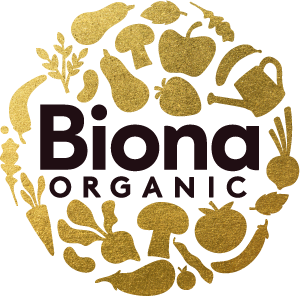5 Reasons Why You Should Eat Organic...
You might already know about the benefits of choosing organic (ahem, it’s not the first time we’ve talked about the subject!).
At Biona, we know a thing or two about organic food and yes, we like to shout about it. And why wouldn’t we? Going organic is great for you and for the planet.
For many people, when they think organic they think free from synthetic chemicals. While that’s part of the story, there’s actually much more to organic food and agriculture.
Organic agriculture is a holistic system of farming that adheres to strict legal standards. It prioritises soil health and animal welfare, and bans artificial fertilisers and pesticides.
There’s more to the benefits of organic food than the incredible taste. If nutritional differences between organic vs conventional food, such as increased omega-3 and antioxidants aren’t enough to convince you, what’s not in organic food might. Eating an organic diet is the best way to limit exposure to pesticides and many additives and preservatives:
Pesticides
Around a quarter of the food we eat contains chemicals designed to kill ‘pests’ (insects, weeds and fungi (1)), regardless of washing and cooking. Organic foods contain lower residual pesticide levels(2) because organic farmers create a natural balance between plants and animals to prevent pests. Additionally, organic standards ban genetically modified (GM) ingredients. Since genetic modification is linked to increased pesticide use, this is another way choosing organic reduces your exposure to pesticides as pesticides are never used in organic farming.
Additives
Organic standards restrict additives such as hydrogenated fats, artificial food colours and preservatives, aspartame and monosodium glutamate. Additionally, organic fruit and vegetables are never washed in chlorine.
Food you can trust
Every product with an organic label has had every part of its production process carefully monitored from farm to shelf. Each organisation involved has to prove they meet organic standards. By choosing organic, you know what’s in your food.
Benefits to Wildlife
Pollinators
Pollination is critical to the existence of three-quarters (3) of the crops we eat, yet pollinator numbers are declining rapidly. The main cause? Synthetic pesticides (4).
There is hope yet: by switching to sustainable practises like organic farming on a large scale(5), researchers think it might even be possible to reverse insect decline(6).
Aquatic Life
Nitrogen fertilisers and other pollutants from conventional farming can create ‘dead zones’ in oceans, rivers and waterways, depriving wildlife of oxygen. As organic methods prohibit these pollutants, choosing organic is supporting aquatic life(7).
Benefits to Animals
Organic farmers must give their animals plenty of space, fresh air, and conditions that suit their natural behaviour. As a result, organic animals don’t need routine medicines like antibiotics. Choosing organic is voting for higher animal welfare standards.
Organic agriculture helps fight climate change
- There is more carbon in UK soils than all of the world’s plants put together (8).
- Researchers say agricultural emissions could drop by up to 50% by 2050 if Europe’s farmland were all organic(9).
- Organic agriculture often uses less energy than conventional farming(10).
- Organic farming also produces crops more resilient to the effects of climate change, because organic soil can store up to double the water(11).
Benefits to Soil
While soil might look humble, it’s incredibly important. Did you know…
- Healthy soil is crucial in over 90% of food production(12).
- One-quarter of all species reside in soil(13).
- UK soils store more water than is in all our lakes and rivers combined.
Scarily, under conventional methods soil is degrading 10-40x faster than it’s formed(14). Organic farming methods nourish soil using natural compost, manure, cover crops, and crop rotation. As well as improving biodiversity generally, these methods encourage microbe diversity (15), decreasing the need for artificial fertiliser.
At Biona, we make it easy to incorporate organic in your everyday essentials. Why not try a few of these simple swaps?
- Store-cupboard staple and super flexible, Organic White Penne Pasta is always a winner.
- Conventional farming often sprays 30 pesticides on tomatoes. Unfortunately, their thin skins allow these chemicals to penetrate the whole fruit. Making the switch to Organic Chopped Tomatoes is the easiest way to avoid them!
- Vegan and with no added sugar, our classic Organic Oaty Granola makes starting the day a pleasure.
As for fresh fruit and veg, check out the dirty dozen for the top 12 foods found to contain pesticide residues. When possible, opt for organic versions of these.
Is Organic Food Worth it?
Some question whether the benefits of eating organic vs non-organic justify the price difference. We think Helen Browning, CEO of The Soil Association, sums it up best:
“The hard work organic farmers put in pays off in the quality of the food they produce, giving real value for money.”
You can find our certified organic products in our online shop, for delivery from a number of other great UK retailers and in all good organic health food shops.
Sources:
-
Smith et al. (2015) The energy efficiency of organic agriculture: A review. Renewable Agriculture and Food Systems, 30, 3
-
Lotter et al. (2003) The performance of organic and conventional cropping systems in an extreme climate year. American Journal of Alternative Agriculture, 18, 3
-
Klein et al. (2007), Proc. Biol. Sci. 274, 303.
-
Sanchez-Bayo and Wyckhuys (2019) Worldwide decline of the entomofauna: A review of its drivers.
-
Bengtsson, J., Ahnström, J., & Weibull, A. C. (2005 ‘The effects of organic agriculture on biodiversity and abundance: A meta-analysis’ Journal of Applied Ecology, 42(2), 261–269. http://doi.org/10.1111/j.1365-2664.2005.01005.x
-
Tuck et al, (2014) Land-use intensity and the effects of organic farming on biodiversity: a hierarchical metaanalysis’,Journal of Applied Ecology
-
Cambardella, C. A., Delate, K. and Jaynes, D. B. (2015) ‘Water quality in organic systems’, Sustainable Agriculture Research, 4(3), 60-69
-
Environmental Audit Committee – Inquiry into Soil Health (2016) Written Submission from the Committee on Climate Change – 14th January 2016
-
Poux, X., Aubert, P.-M. (2019) Agroecology and carbon neutrality in Europe by 2050: what are the issues? IDDRI, Issue brief N.05/19
-
Smith et al. (2015) The energy efficiency of organic agriculture: A review. Renewable Agriculture and Food Systems, 30, 3
-
UN Food and Agriculture Organisation (2015), Healthy soils are the basis for healthy food production
-
Natural England, 2015, Summary of Evidence: Soil
-
Muller et al. (2016) Organic farming, climate change and beyond. IFOAM EU and Fibl, p12
-
Pimental (2006) Soil Erosion: A food and environmental threat. Environment, Development and Sustainability, 8 (1), p.119-137.
-
Lori et al. (2017) Organic farming enhances soil microbial abundance and activity. A meta-analysis and metaregression. PLoS ONE 12(7):e0180442









